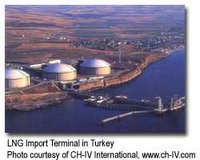
Still though, they are important to the region. People in the Greater Boston region need to decide if the pros are worth taking the cons in the construction of this project. The biggest concern is safety. Will this project be safe? Could an accident or bomb cause a massive explosion that would be seen and felt in Hull, just two miles away? Boston, at ten miles distance, seems to be safer.
According to Richard Clarke, the same Richard Clarke who President Bush ignored before 9/11, was hired by the LNG company, AES Corp, to study the safety of the project. That's the subject of today's Globe article. Richard Clark thinks it's safe.
Now, is Clarke right? While Clarke is certainly an expert on terrorism, does he know the full destructive capability of an LNG tank? More importantly, Clarke was hired by AES Corp - not by an independent source. While I believe it's more likely Clarke is being honest and frank, a second opinion is needed. However, it doesn't seem as if the AES Corp wants one.Former White House counterterrorism official Richard A. Clarke, hired by AES Corp. to conduct a safety review of their proposed site on Outer Brewster Island for an LNG terminal, said terrorists would probably not target the island and even if a catastrophe occurred, it wouldn't reach populated areas.
Clarke, in his safety analysis, said Hull residents -- who are 2 miles from Outer Brewster -- would be more at risk if the town's wind turbine fell down than if an LNG tanker blew up. He also said two proposed LNG sites 10 miles off Gloucester would probably be safe, too.
State environmental chief Stephen Pritchard said unusual language in the bill excludes any environmental review until after the lease has been signed. Normally, a review is conducted before a project begins to move forward.If Massachusetts wants to look seriously into this matter, it should conduct a full environmental review before any project can move forward. Richard Clarke's word is important, but it's an entirely different subject - safety - and doesn't replace a full environmental review.
Ultimately, I think John Kerry is right on this subject.
‘‘I do think the LNG proposal in Boston Harbor is worth looking at. It holds some promise and potential, and it’s worthy of being thoroughly explored.’’The project should be further explored. Boston needs the gas (people sure felt it this winter) and the Everette facility is a risk to thousands of people.
[Clark] linked the closing of the Everett terminal -- a long-term goal of state officials deeply worried about a tanker catastrophe in Boston Harbor -- to the construction of Outer Brewster, saying ''you cannot close Everett without onshore storage of LNG."
If creating a new terminal in the Harbor, miles away from the population, means Everett could be shut down - this proposal becomes more attractive. Furthermore, the Boston Harbor National Recreational Area would stand to get $10 million a year from the AES Corp for allowing this project. A lot can be done with that kind of money, including making the national parks in Boston Harbor a more frequently visited tourist spot.
Still, some questions remain. The owners of the Everett LNG facility don't want to close. The land could perhaps be taken by eminent domain, but that will be a costly legal battle for the state. If this Outer Brewster project takes place, Everett's facilities should be closed. They are a danger to the population.
The Outer Brewster project faces an uphill battle at the state house - which is a very good thing. The state house is in a position to make sure the project is 100% safe, both from bombs and accidents as well as make sure it's environmentally sound. Any support for the LNG proposal in Boston Harbor should be very tentative.
PS: I'm looking forward to many comments on this subject, especially by people who may have a greater working knowledge on this issue or a completely different take. It should be interesting.




1 comment:
Thoughtful posting. My feeling is that if we need LNG, we don't need to build every terminal that has been proposed and we certainly don't need any terminals that pose safety risks or that are located in public recreation areas (the BHINRA). Check out www.savethebrewsters.org for more discussion on this last point.
Post a Comment